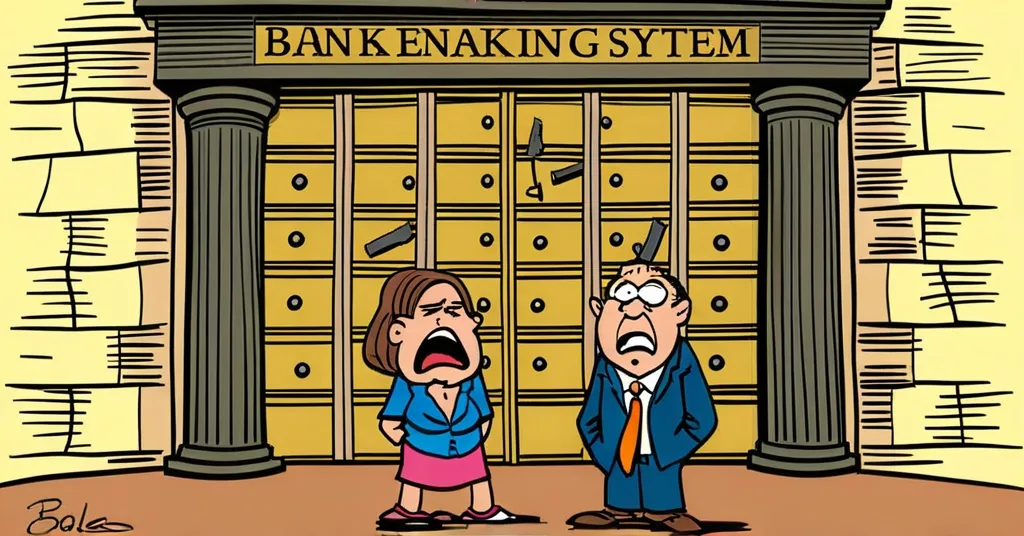Wells Fargo Fraud: $40K Stolen from Texas Couple’s Account Amid Bank’s Inaction

Wells Fargo Fraud Case: Texas Couple’s $40,000 Nightmare
- $40,000 stolen from business account
- Wells Fargo ignored fraud warnings
- Criminal investigation initiated
The Vasquezes’ Nightmare
On January 27, Jose and Amanda Vasquez, a Texas couple, found themselves in a financial nightmare when $40,000 was stolen from their Wells Fargo business account. Despite their urgent pleas, the bank allowed the fraudulent transfers to proceed, sparking a criminal investigation and raising serious questions about the security of customer funds.
Jose Vasquez recounted his frantic efforts to stop the transactions:
“I said, ‘hey, please stop the transaction. It’s still pending. I don’t recognize it. I don’t authorize this transaction.’ They said, ‘no, we’re going to let it hit the other account, and we’ll investigate.”
Wells Fargo’s Response
Despite these warnings, Wells Fargo allowed both transactions to go through. The following day, another $20,000 was fraudulently transferred, and again, the bank did nothing to stop it. Amanda Vasquez expressed her frustration:
“It’s frustrating. At the end of the day, the bank is there to protect customers and they’ve done absolutely nothing to do that. They wrote us a letter saying this is not fraud. Sorry.”
The couple, feeling helpless, turned to law enforcement. The Fort Bend County Sheriff’s Detective confirmed the fraudulent nature of the transactions and issued subpoenas (legal orders to retrieve information), validating the Vasquezes’ claims. Amanda highlighted the broader implications of their ordeal:
“Fortunately, this came from a business account. It didn’t affect our personal account. Had it been someone else, like our parents or someone old or retired who rely on this, what would they do? How would they pay their bills?”
Broader Industry Issues
This incident sheds light on the ongoing tension between banking institutions and their responsibility to safeguard customer funds. Wells Fargo’s initial response was to close the case, claiming no fraud was detected, which sharply contrasts with their public statements to FOX 26 that they were still investigating. This discrepancy raises questions about the bank’s commitment to protecting its customers and the effectiveness of their fraud detection systems.
In the context of increasing digital banking and sophisticated fraud, this case is not isolated. The Consumer Financial Protection Bureau (CFPB) has filed a lawsuit against Wells Fargo and other major banks for similar issues with Zelle, a payment platform they operate. CFPB Director Rohit Chopra criticized banks for rushing to launch Zelle without proper safeguards, turning it into a “gold mine for fraudsters.” This critique could very well apply to Wells Fargo’s handling of the Vasquezes’ case, highlighting a systemic issue within the industry.
The Way Forward
The Vasquezes’ experience underscores the vulnerability of consumers, particularly those with business accounts, which may not be covered by the same protections as personal accounts under Regulation E (a federal regulation that offers protections for consumers against unauthorized electronic fund transfers from personal accounts). This could prompt discussions about extending similar protections to business accounts, ensuring that all customers are equally safeguarded against bank fraud.
The incident not only impacts the Vasquezes but also erodes public trust in financial institutions. As the criminal investigation unfolds, potential legal and regulatory actions against Wells Fargo could lead to stricter regulations and better fraud protection measures across the industry.
Key Questions and Takeaways
- What happened to the Vasquezes’ bank account?
Their business account was defrauded of $40,000 through two separate $20,000 transfers despite their immediate warnings to Wells Fargo.
- How did Wells Fargo respond to the fraud allegations?
Wells Fargo initially allowed the transactions to proceed and later closed the case, stating no fraud was detected. They claimed to still be investigating after public attention.
- What actions have the Vasquezes taken in response to Wells Fargo’s inaction?
They have initiated a criminal investigation, and the Fort Bend County Sheriff’s Detective has confirmed the fraudulent nature of the transactions and issued subpoenas.
- What broader issues does this incident highlight?
It raises concerns about the effectiveness of banks’ fraud detection and prevention measures, as well as their commitment to protecting customer funds.
- What could be the potential impact on other bank customers?
This incident may lead to increased scrutiny of banks’ fraud policies and could prompt customers to seek more secure banking options or demand better protection.
The Cryptocurrency Connection
In the world of cryptocurrency and blockchain, where decentralization and security are paramount, incidents like these underscore the importance of robust fraud prevention measures. While traditional banks struggle with these issues, the crypto community continues to push for solutions that prioritize user security and autonomy, even as they face their own unique challenges. Decentralized systems like blockchain offer an alternative to traditional banking, potentially providing better security. However, they also face challenges such as smart contract vulnerabilities and regulatory uncertainty.
This Wells Fargo fraud case serves as a stark reminder of the vulnerabilities in traditional banking systems. As we champion decentralization, privacy, and disrupting the status quo, we must acknowledge that while cryptocurrencies and blockchain technologies offer promising solutions, they are not immune to fraud. The crypto community must remain vigilant against scams and continue to innovate in the realm of effective accelerationism (e/acc) to ensure the financial revolution benefits everyone, not just those with the means to navigate its complexities. Bitcoin maximalists may argue for the superiority of Bitcoin’s security, but acknowledging the roles of altcoins and other blockchains is crucial in addressing the diverse needs of the financial ecosystem.



